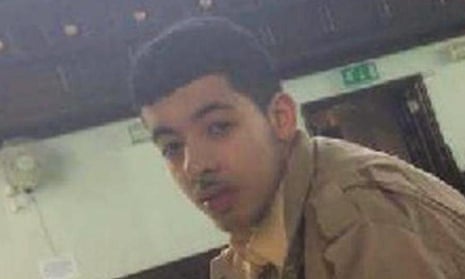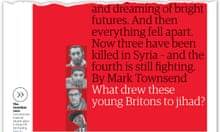Salman Abedi seemed, on the face of it, an unlikely jihadi: a quiet lad from a well-known family, a “fun guy”, according to friends at school, who loved football and was good at it, supported Manchester United and enjoyed a game of cricket.
Others said he was a bit of a party animal, who drank vodka and smoked weed daily, was popular with girls and “always clubbing or at house parties”, listening to rap and grime music. A young man, in other words, like so many others in Manchester: unconcerning, unremarkable.
But as more details have come to light in the past five days about Abedi, a more complex and troubling picture has emerged of the 22-year-old, who strapped on a backpack loaded with bolts, screws and explosives, walked into the foyer of Manchester Arena on Monday night and murdered 22 children and adults at a pop concert.
He was, according to terrorism experts, just the sort of individual vulnerable to radicalisation, drifting or being manipulated into holding violent extremist views and, eventually, acting on them.
Abedi was not very bright, according to former schoolmates and teachers, and was a victim of bullying who struggled to control his aggression and frequently got into fights, sometimes because he objected to the morals of others, sometimes for no discernible reason at all.
He hung out with a criminal gang in his neighbourhood in south Manchester, a tiny geographical area where there was recruitment to Islamic terrorist groups. His family, active in the local mosque and community, had concerning connections to a militia in his parents’ home country of Libya that has been linked to al-Qaida and is banned in the UK. His father left Abedi in Manchester on his own when he was 17, an age at which he was vulnerable, perhaps, to falling under other influences.
Most troubling of all is the fact that Abedi’s extremism was not a secret. He was still a teenager when friends rang a police counter-terrorism hotline five years ago to express concerns about his behaviour. On at least four other occasions, community leaders and members of his family were reported to have warned of his dangerous tendencies. Why those warnings were dismissed or overlooked, and how many other young men may be in a similar category to Abedi, will be the subject of urgent investigation by security services.
Abedi was born in Manchester in 1994, the second son of Ramadan Abedi and his wife, Samia Tabbal. Ramadan Abedi, who had reportedly been a security officer under the then Libyan leader Muammar Gaddafi, and Tabbal fled as dissidents and were given refuge in the UK. After settling first in London, they moved to Manchester, the home of the UK’s biggest Libyan community, centred on the southern suburbs of the city.
The family, including Ismail, a year older than Abedi, the couple’s youngest son, Hashim, and their youngest daughter, Jomana, were raised as active members of the moderate Didsbury mosque and attended local schools. Abedi moved between several schools in the area, including Burnage Academy, which confirmed he was a pupil between 2009 and 2011.
Friends recalled that he was not very devout as a younger teenager, and was teased about his prominent ears and given the nickname Dumbo. “He would drink, it was mainly vodka, and smoke weed,” said one school friend who knew him for seven years. “He was always clubbing or at house parties. He was always popular with women at the parties.”
One friend said Abedi started fights in the street for no reason, while another told of an incident in which he punched a female classmate in the head, saying “he could have killed her”, because he didn’t approve of what she was wearing.
Mark Roberts, who taught Abedi media studies at Burnage Academy, wrote in TES that he saw “no signs of a young man that wanted to take life through the most callous and senseless of acts”.
“Instead, all I can give are banal anecdotes about a dislikeable boy who displayed mediocre rudeness and refused to complete his homework on time,” Roberts said.
Another former tutor at Trafford College, who taught Abedi as a teenager on a course “for people who are exceptionally low level”, described him as “a very slow, uneducated and passive person”. The tutor, who asked not to be named, said staff or peers at the college were among those who raised concerns with the police about Abedi’s views. “I know people did report him for some of the comments made,” the lecturer told the Guardian. “It was fed through to the police.”
Quite when Abedi’s aggressive tendencies acquired an ideological bent is difficult to establish, but it has emerged that he travelled to Libya as a 16-year-old in 2011 to join the Libyan Islamic Fighting Group (LIFG) and fight alongside his father in the battle to oust Gaddafi.
His father was a prominent member of the militia, which was banned in the UK because of its jihadi links. According to one report, Abedi was injured during the fighting, but his sister, Jomana Abedi, told reporters this week that after Gaddafi was defeated, Abedi “left the militia and we all went back to the UK”. Their father largely settled back in Libya, however, with the rest of the family coming and going between Tripoli and Manchester, leaving Abedi and his older brother, Ismail Abedi, alone for much of the time in the family home in Fallowfield, south Manchester.
According to a neighbour, the departure of Ramadan Abedi to Libya was the trigger for his second son to go “off the rails ... He suddenly had all this freedom and started partying loads”. But after one trip to see his parents, which some said occurred 18 months ago, Abedi became increasingly devout and judgmental.
He fell in with a new crowd of “Libyan and Arab guys”, according to a friend, who said: “He started university, but started shutting himself off and no longer hung around big rowdy groups, he was always by himself.
“He started ignoring old friends and wouldn’t look them in the eye. He lowered his gaze and looked at the ground when he walked past people. He became more studious, more religious.”
Neighbours and acquaintances have highlighted Abedi’s growing religious intolerance in this period, including an incident when an imam at Didsbury mosque, where his father had worked, gave a sermon criticising Islamic State and was given a “look of hate” by Abedi afterwards.
Investigators have spent this week investigating Abedi’s possible links to other jihadis in the area. A Guardian investigation earlier this year revealed that 16 convicted or dead terrorists had emerged from the same 2.5 sq miles in south Manchester where Abedi lived.
The bomber had close connections with criminal gangs in the area, which have a growing influence on young Libyans, according to one community leader. Abedi was deeply upset when one of his friends was embroiled in an alleged gang feud last year, his sister said this week, and some friends have suggested that this trauma might have added to his sense of alienation.
One relative said Abedi had referred to Britons as “infidels” who “are unjust to the Arabs”; he was, she added, “a great kid”. Abedi began wearing more traditional Arab dress and was seen by one neighbour saying Islamic prayers loudly in the street, but he remained hotheaded and volatile, picking fights with neighbours over issues such as where their cars were parked.
How this angry, increasingly radical young man became connected to what appears to be a sophisticated terrorist cell is the subject of urgent inquiry for security services in Britain and further afield.
Did Abedi have training from Islamic extremist networks in Libya, Germany or Syria? If he did not make the sophisticated bomb, as has been assumed, how, where and from whom was the device acquired?
What is clear is that until less than a week before the attack, Abedi was at his parents’ home in Libya, having gone there on 18 April, according to local authorities. Fearful of the connections his son had been forming back home, his father reportedly confiscated Abedi’s passport, relenting only when his son told him he was going on a pilgrimage to Mecca.
Ramadan Abedi has condemned the attack, but has since been arrested by Libyan forces, along with his youngest son, Hashim. Ismail Abedi was among those arrested in Manchester this week.
Jomana Abedi said her brother had been driven by a desire to seek “revenge” for US military attacks in the Middle East.
On 17 or 18 May, Abedi left Libya, flying home via Istanbul and Düsseldorf. By 19 May, he was back in Manchester. At 8pm that Friday evening, he withdrew £250 from a cash machine and was captured on CCTV in the Arndale Centre, after apparently buying the £22 turquoise and black Karrimor rucksack that he would later pack with the explosive device.
The bomber’s movements between Friday and Monday are under intense scrutiny, with police examining a number of properties in central Manchester and elsewhere. But it is believed that before leaving for the Manchester Arena on Monday evening, he was at a rented city centre flat in Granby Row believed to be where parts of the bomb were assembled.
Minutes before the blast, according to Libyan authorities, Abedi phoned his mother and younger brother in Tripoli. The purpose of the call, according to one official, was to ask forgiveness for what he was about to do.










